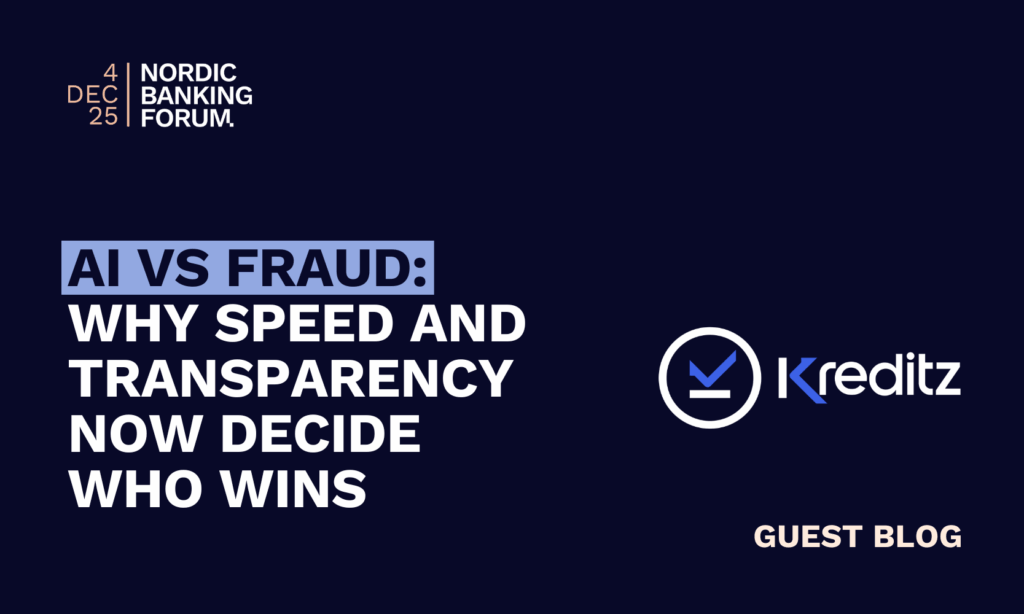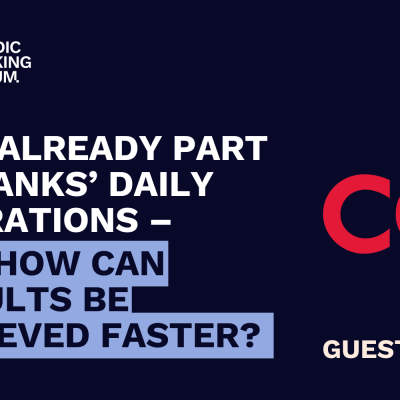On Dec 4, 2025, Kreditz will sponsor the Nordic Banking Forum in Helsinki.
Fraud is moving faster than the systems built to stop it. Powered by AI, synthetic identities and even deepfakes, the new wave of digital crime is evolving at machine speed, exploiting the very technologies meant to protect us. Across Europe, regulators are responding with a clear message: prevention must be real-time, data-driven and explainable.
At Kreditz, we’ve seen this shift first-hand. During the Financial Fraud Forum 2025, we asked financial professionals how ready they feel to fight modern fraud. The results were telling! Identity theft and social engineering were ranked the most damaging threats. Yet most organisations rated their overall preparedness at just 3.5 out of 5.
The gap between threat and defence is widening, and AI is part of both sides of the equation.
From hindsight to foresight
Traditional fraud models are still built on what has already happened. They flag transactions after the fact or rely on static rules that quickly become outdated. As fraudsters use AI to mimic customers, forge documents or manipulate voice and video, static controls simply can’t keep up.
That’s why regulators, from the EU’s upcoming AI Act to the European Banking Authority’s guidelines on model transparency, are increasingly emphasising the need for real-time, explainable AI. Systems must not only detect anomalies but also show how and why decisions are made. Trust depends on it!
Open Banking: turning raw data into foresight
The real breakthrough comes when Open Banking data is paired with AI. Transaction-level data gives financial institutions a live picture of income, spending and behavioural patterns. Machine learning and AI can then analyse those signals to spot what the human eye or a traditional credit check would miss.
As Magnus Källhager, Co-Founder of Kreditz, explains:
Fraud doesn’t announce itself. It hides in behaviour, not in credit scores. The power of Open Banking is that it shows what’s real and how people actually live, earn and spend, and that’s where the early warnings live.
This combination of transparency and technology is changing the game. Instead of reacting to fraud losses, banks can predict risk before a transaction even happens. It’s a fundamental shift from chasing fraud to preventing it before it even happens.
Why this matters for Nordic institutions
In the Nordics, where digital adoption and consumer trust are high, this evolution is more than a compliance exercise. It’s about protecting the very currency of modern finance: trust!
By embracing Open Banking-driven intelligence, institutions can reduce losses, meet regulatory expectations, and give customers confidence that their data is used responsibly and securely.
The winners in the future won’t just be the ones who stop fraud fastest. They’ll be the ones who can explain how things work; transparently, in real time, and with data you can trust.
AUTHOR
Magnus Källhager stands as one of the co-founders behind Kreditz, a dynamic fintech enterprise operating within the realm of PSD2. As the Head of the Advisory Services division, he spearheads the development of a cutting-edge categorization engine that adeptly deciphers bank transaction data. Kreditz is dedicated to revolutionizing credit assessment with heightened precision and efficiency, employing credit scoring and affordability computations. With 20 years in the credit industry, Magnus has broad experience setting up credit processes in consumer and business lending. Starting his career as an analyst and model developer at Enento (UC) he has worked with many of the major banks and financial institutions. He has also been Chief Credit Officer at Skandiabanken, validating the IFRS9 models at Handelsbanken, and worked as a risk manager at some niche banks, among other things.
KREDITZ
Want to hear more? Access tons of free and paid courses exploring the next chapter in banking, insurance and finance at the Digital Banking Academy!




